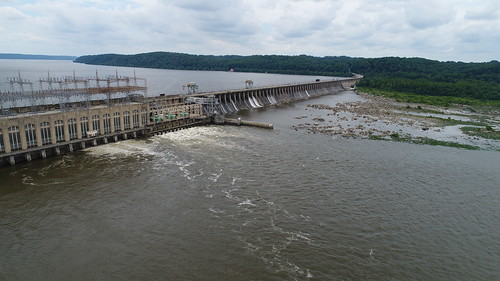Chesapeake Bay and Environmental Progress at the Conowingo Dam
Exelon Makes Initial Payments of More than $5.7 Million to Maryland under $200 Million Agreement Incorporated into Dam Relicensing

Photo by Stephen Badger/Maryland Department of Natural Resources
Maryland has received the first payments, totaling more than $5.7 million, under an agreement that requires the owner of the Conowingo Dam to invest in environmental projects and operational enhancements to improve water quality in the Lower Susquehanna River and the Chesapeake Bay.
Conowingo Dam owner Exelon Generation Company LLC made payments to the Maryland Department of the Environment (MDE) and the Maryland Department of Natural Resources (DNR) to allow for the start of a series of projects that will play a key role in Maryland’s holistic strategy to improve water quality and accelerate the restoration of the Chesapeake Bay. The agreement requires a total of more than $200 million in investments by Exelon, including nearly $107 million in payments to Maryland, over the 50-year term of its recently renewed federal license.
“After nearly a decade of gridlock, the funds and actions for clean water and climate action at the Conowingo Dam are finally beginning to flow to the benefit of the state and the Chesapeake Bay,” said Maryland Environment Secretary Ben Grumbles. “We have a hard-fought and fully-enforceable commitment by the dam owner now in place under federal and state law, but we know more action is needed throughout the watershed. This is why we’re taking a holistic approach, working with states and the federal government to increase climate resiliency and prevent pollution far upstream and directly behind the dam. We’re also committed to working with citizens and stakeholders on the best ways to prioritize and maximize the benefits of this work for years to come.”
“We look forward to implementing the Conowingo settlement, which will enhance Maryland’s ongoing pollution reduction efforts in the Chesapeake Bay,” Maryland Department of Natural Resources Secretary Jeannie Haddaway-Riccio said. “The funds for projects such as enhanced forest buffers, water quality monitoring, and freshwater mussels, which have significant filtering capabilities, will contribute to a cleaner Bay for decades to come.”
Last week, Exelon paid:
- $2 million for an unprecedented initiative to restore a healthy population of pollution -filtering freshwater mussels in the Susquehanna River, including contribution of land to support this effort. This is part of a $25 million total investment.
- $1.5 million for projects to improve water quality in the Chesapeake Bay, including agricultural projects such as cover crops and forest buffers. This is part of a $19 million total investment.
- $1 million for research and projects related to eels and eel passage.
- $500,000 for climate resiliency projects, including submerged aquatic vegetation, clams, oysters, and the creation of living shorelines. This is part of a $47 million total investment.
- $500,000 for a feasibility study of dredge material disposal options.
- $16,400 for continued funding annually of a flow gage downstream of the dam until the redesign and installation of best available real-time flow measurement and monitoring is completed. The agreement also requires Exelon to invest an estimated $52 million to implement new requirements for flow control that will create more natural conditions, which will enhance the downstream and upstream ecosystems.
Future investments will also include $41 million to significantly increase efforts to remove trash and debris flowing down the Susquehanna River, among other ecological and environmental improvements.
The investments are being made under an October 2019 agreement that settled Exelon’s legal challenges to the water quality certification issued in 2018 by Maryland under Section 401 of the Clean Water Act. The agreement removed the prospect of years of costly litigation and delay and, instead, set the stage for immediate and lasting water quality benefits for the Susquehanna River and Chesapeake Bay.
Elements of the agreement were submitted for approval to the Federal Energy Regulatory Commission (FERC) as part of the licensing renewal for the Conowingo hydroelectric dam. In announcing its decision to issue a new license to Exelon, FERC noted that its order incorporates settlements involving Exelon, the Department of Interior and MDE. The license includes conditions to enhance fish migration, protect bald eagles and other wildlife, upgrade 13 public recreation sites, address sediment issues and protect archaeological and historic sites.
Scientific reports confirm that the Conowingo Dam has reached full capacity and can no longer stop pollution from entering Chesapeake Bay, which severely threatens the state’s and region’s ability to meet the Bay’s cleanup goals. The Hogan administration’s holistic strategy includes the conditions relating to the relicensing of the dam, a pilot project on beneficial reuse of dredged material, and an unprecedented, multi-state Conowingo Watershed Implementation Plan specifically for the effects of upstream discharges and the lost trapping capacity of the Conowingo Dam on Chesapeake Bay restoration.

 1-888-373-7888
1-888-373-7888 233733
233733